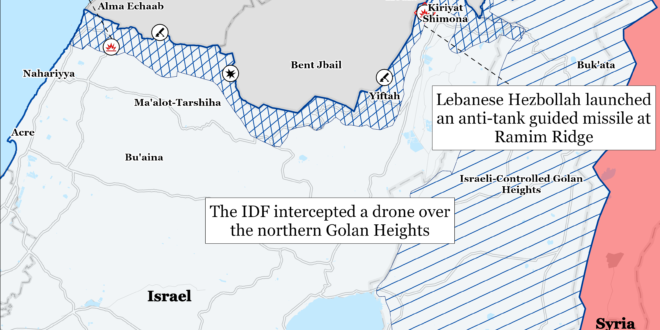Iran and its Axis of Resistance may target US forces in Syria as part of a retaliatory strike for Israel killing several Axis of Resistance leaders, including Hamas Political Bureau Chairman Ismail Haniyeh. Euphrates Post reported that Iranian-backed Iraqi militias Kataib Hezbollah, Sayyida al Shuhada, and Harakat Ansar Allah al Awfiya deployed fighters to eastern Syria on July 31 “with the aim of targeting the International Coalition bases in Hasakah Governorate.[1] Euphrates Post sources in Homs Governorate reported that unspecified Iranian-backed fighter have moved “heavy equipment” and rocket launchers from militia warehouses in Jabal al Mazar into the desert east of Palmyra.[2] Iranian-backed Iraqi militias conducted over 170 attacks targeting US forces in Iraq and Syria between October 2023 and January 2024 including US positions in Hasakah and Homs Governorates.[3] Mashhad Friday prayer leader Imam Ahmad Alam ol Hoda claimed that US support for Israel emboldened Israel to kill Haniyeh in Tehran and declared that “[Iran] demands blood” from the United States[4]
Iran is very likely taking into consideration US and allied support defending Israel as it considers how to cause greater damage than the April 2024 attack did. Iran and its allies fired around 170 one-way attack drones, 30 cruise missiles, and 120 ballistic missiles at Israel in the April 2024 attack.[5] Iran designed this strike package of over 300 projectiles to inflict serious damage on Israel. The United States and allied forces in the region intercepted a majority of the drones and missiles on route for Israel during Iran’s April 2024 attack.[6] The United States, Israel, and allied countries in the region collectively intercepted approximately 99% of all munitions launched by Iran during its April 2024 attack.[7]
Iranian-backed militia attacks targeting US bases in Syria could pull resources away from engaging and intercepting munitions bound for Israel in some circumstances. If US focus had to orient around defending US ground positions, Iran could calculate that the effectiveness of the integrated regional air defense that defended Israeli territory in April 2024 would be reduced. Tehran might expect that attacks targeting US forces in combination with a large-scale drone and missile attack conducted by the Axis of Resistance could be significantly more effective. Achieving the greatest impact of attacks on US forces to draw resources away from intercepting Iranian strikes against Israel would require a high degree of coordination across the Axis of Resistance and would need to be precisely timed. It is far from clear that Iran and its proxies and partners could coordinate many disparate air and ground operations that finely. US and allied forces can also take many measures to mitigate these risks.
The following indicators would support the hypothesis that Iranian-backed militias are preparing to attack US forces in eastern Syria.
Iranian-backed militias massing additional forces in or around eastern Syria
Iranian-backed militias leaving their stations in western Iraq or other parts of Syria
Iranian or Iranian-backed militia leaders meeting in eastern Syria
Iranian-backed militias flying ISR drones around US forces in eastern Syria
Iranian-backed militias in eastern Syria conducting exercises simulating attacks on US forces
Iranian or Iranian-backed militia leaders in eastern Syria taking heightened security precautions
Iranian or Iranian-backed sources signaling publicly the possibility of intensified conflict in eastern Syria
Iranian-backed militias rapidly increasing the dissemination of anti-US disinformation in eastern Syria
CTP-ISW has not independently observed confirmation of any of these indicators, and many of them are unlikely to be observable in the open-source environment.
Iran is likely considering its ability to maintain nuclear deterrence against Israel as it plans its retaliatory strike against Israel. Iranian nuclear deterrence against Israel most likely requires that Iran demonstrate a reasonable ability to strike Israeli territory with a delivery device capable of carrying a nuclear warhead. Iran’s April 2024 attack on Israel demonstrated it is not capable of effectively penetrating Israeli air defenses. The Iranians may shape this attack deliberately to try to establish that they can, indeed, get a nuclear-capable missile to a target in Israel. That course of action would require strike planning to focus on ensuring that the ballistic missiles succeed in hitting at least some of their targets and would not be satisfied if only drones or small missiles penetrated Israeli and partner air and missile defenses.
Anonymous Western intelligence sources told Sky News Arabia that Iran and Lebanese Hezbollah may attack Israel on the Jewish holiday Tisha B’Av on August 12-13 in retaliation for Israel killing Ismail Haniyeh.[8] Tisha B’Av commemorates the destruction of the First and Second Temples and is widely considered a day of sadness and tragedy. An Iranian-Hezbollah attack on this date would come about 12-13 days after Israel killed Haniyeh on July 31. Iran similarly waited 13 days before retaliating against Israel in April 2024 for killing senior IRGC commander Brigadier General Mohammad Reza Zahedi.[9]
US and UK officials have engaged Israel to affirm support and coordinate defensive action in preparation for an Iranian-led attack on Israel. US President Joe Biden spoke with Israeli Prime Minister Benjamin Netanyahu by phone on August 1 and reaffirmed the United States’ commitment to supporting Israeli security.[10] Biden discussed US efforts to support Israel ”against ballistic missiles and drones,” including new defensive US military deployments.[11] US Secretary of Defense Lloyd Austin spoke with Israeli Defense Minister Yoav Gallant on August 2 and discussed the United States’ ongoing and future defensive force posture changes in support of Israel.[12] The US Department of Defense announced that Austin had not yet decided which forces to deploy.[13] Israeli officials also engaged with their UK counterparts on August 2. Gallant met with UK Secretary of State for Defense John Healy to discuss creating a coalition of states in Israel’s defense against Iran and Iranian-backed militias.[14] IDF Chief of Staff Herzi Halevi and UK Army Chief of Staff Admiral Tony Radakin conducted a joint assessment and discussed UK-Israeli cooperation in the region.[15]
Ismail Haniyeh was buried in Doha, Qatar, on August 2.[16] Senior Hamas officials, including Khaled Meshaal, attended the funeral ceremony.[17] Meshal is considered to be a top contender to replace Haniyeh as Hamas Political Bureau chairman. Other senior officials attended as well, such as Iranian First Vice President Mohammad Reza Aref, Qatari Emir Tamim bin Hamad al Thani, and Turkish Foreign Affairs Minister Hakan Fidan.[18]
Key Takeaways:
Syria: Iranian-backed Iraqi militias have moved fighters and weapons to eastern Syria in order to attack US forces there, according to local Syrian reports. Iran directing a militia attack on US forces at the same time as an Iranian drone and missile attack on Israel could hinder the US ability to defend Israel.
Iran: Anonymous Western intelligence sources told Sky News Arabia that Iran and Lebanese Hezbollah may attack Israel on the Jewish holiday Tisha B’Av on August 12-13 in retaliation for Israel killing Ismail Haniyeh.
Israel: US and UK officials have engaged Israel to affirm support and coordinate defensive action in preparation for an Iranian-led attack on Israel.
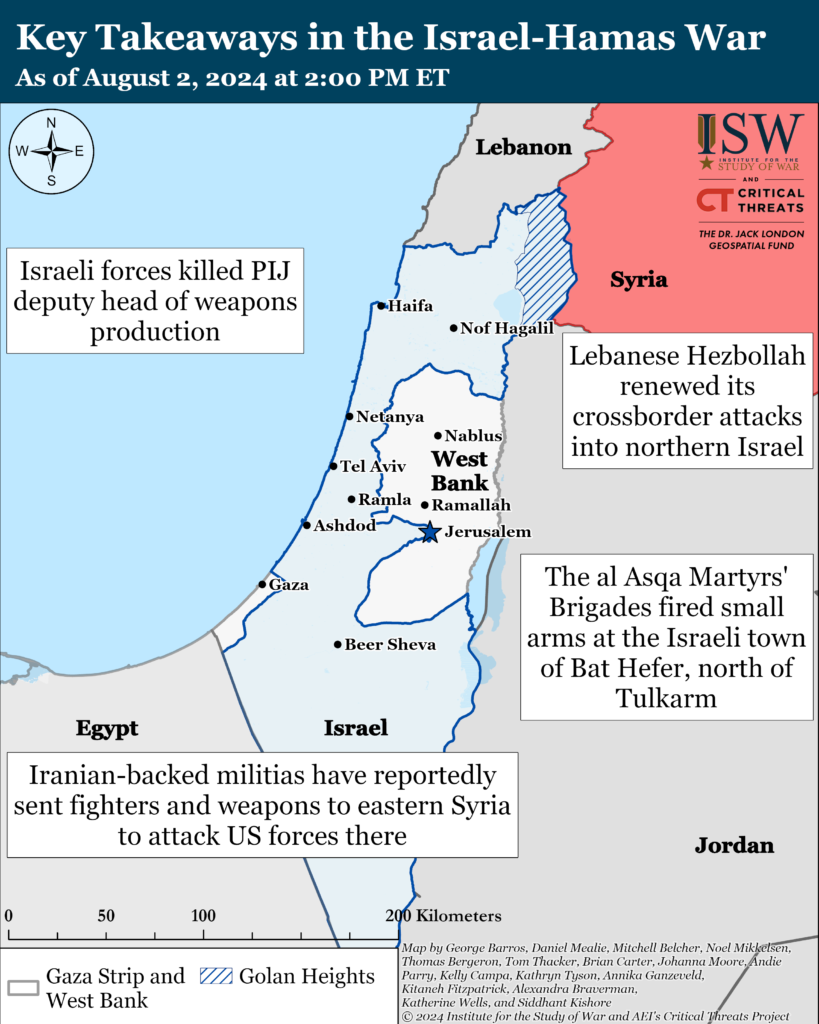
Gaza Strip
Axis of Resistance objectives:
Erode the will of the Israeli political establishment and public to sustain clearing operations in the Gaza Strip
Reestablish Hamas as the governing authority in the Gaza Strip
The IDF announced on August 2 that it targeted and killed Palestinian Islamic Jihad (PIJ) deputy head of weapons production Mohammed al Jabari in the Gaza Strip.[19] The IDF said that Jabari oversaw weapons distribution to fighters in the northern Gaza Strip, managed salary distribution, and supported PIJ efforts to resume rocket production.[20]
Saudi-owned, London-based newspaper Asharq al Awsat reported that the IDF killed five Hamas political and military leaders in an airstrike in Gaza City over a week ago, citing sources close to Hamas.[21] Asharq al Awsat reported that the IDF conducted an airstrike targeting the five leaders in a tunnel in an industrial area southwest of Gaza City, causing the tunnel to collapse.[22] The report said that the IDF killed Hamas Political Bureau members Rawhi Mushtaha and Sameh al Siraj and al Qassem Brigades commanders Abdul Hadi Siam, Sami Odeh, and Mohammed Hadid.[23] The IDF said in November 2023 that it targeted Mushtaha and al Siraj in a tunnel but did not confirm their deaths.[24] Israeli media said that Mushtaha previously served as “de facto prime minister of the Gaza Strip” and currently managed Hamas Political Bureau financial affairs.[25]
The IDF 252nd Division continued clearing operations around the Netzarim Corridor on August 2.[26] The IDF 16th Brigade Jerusalem Reservist Brigade began operations along the Netzarim Corridor and identified a militia cell emerging from a tunnel to attack Israeli forces. Israeli forces directed an airstrike targeting the fighters.[27] The IDF 10th ”Harel” Reservist Brigade and IDF Air Force destroyed a building storing explosives and large quantities of weapons.[28] The al Aqsa Martyrs’ Brigades separately mortared Israeli forces along the Netzarim Corridor.[29]
The IDF 162nd Division continued clearing operations in Rafah on August 2.[30] The IDF Givati and Nahal Brigades continued to operate in Rafah on August 2.[31] Israeli forces killed approximately 30 Palestinian fighters during close quarters combat and via airstrikes over past day.[32] An Israeli military correspondent reported that the ”end of fighting” in Rafah has been delayed for several weeks due to slow progress in degrading the Rafah Brigade and destroying the large tunnel systems beneath Rafah and the Philadelphi corridor on the Egypt-Gaza Strip border.[33] The IDF Givati and Nahal Brigades are currently the only two brigades deployed in Rafah, and the correspondent said that the destruction of underground infrastructure is a ”long and drawn-out process to be effective.”[34] The National Resistance Brigades targeted Israeli forces with an anti-personnel mine in al Brahma, west of Rafah.[35]
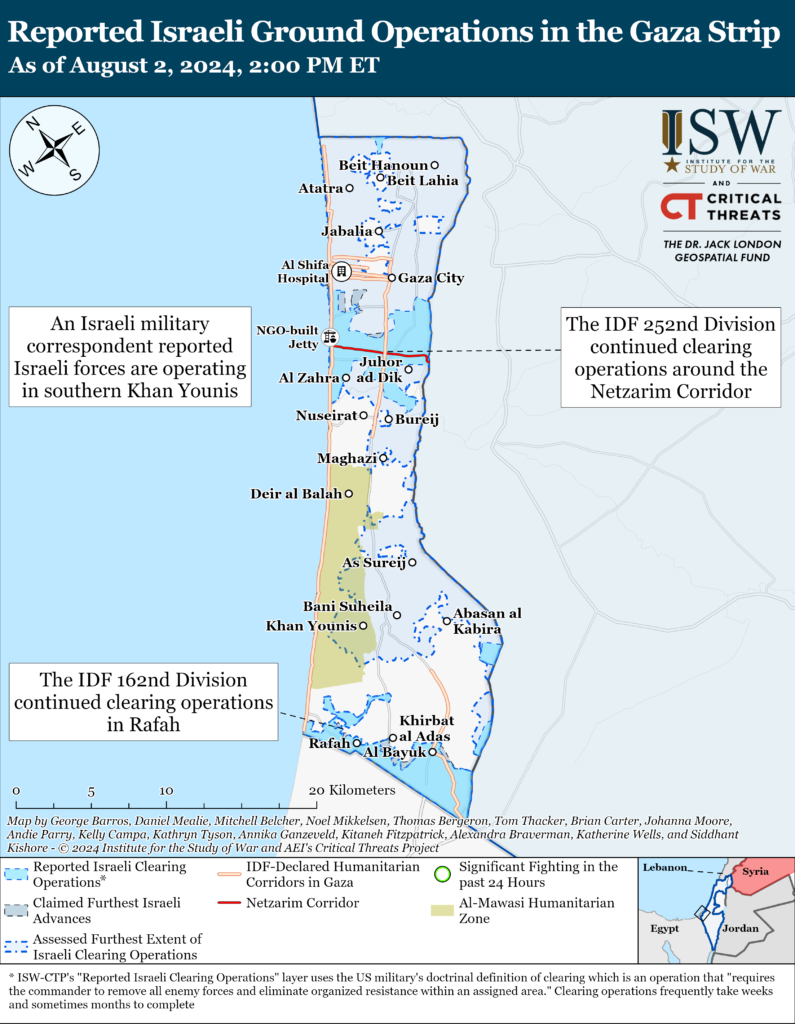
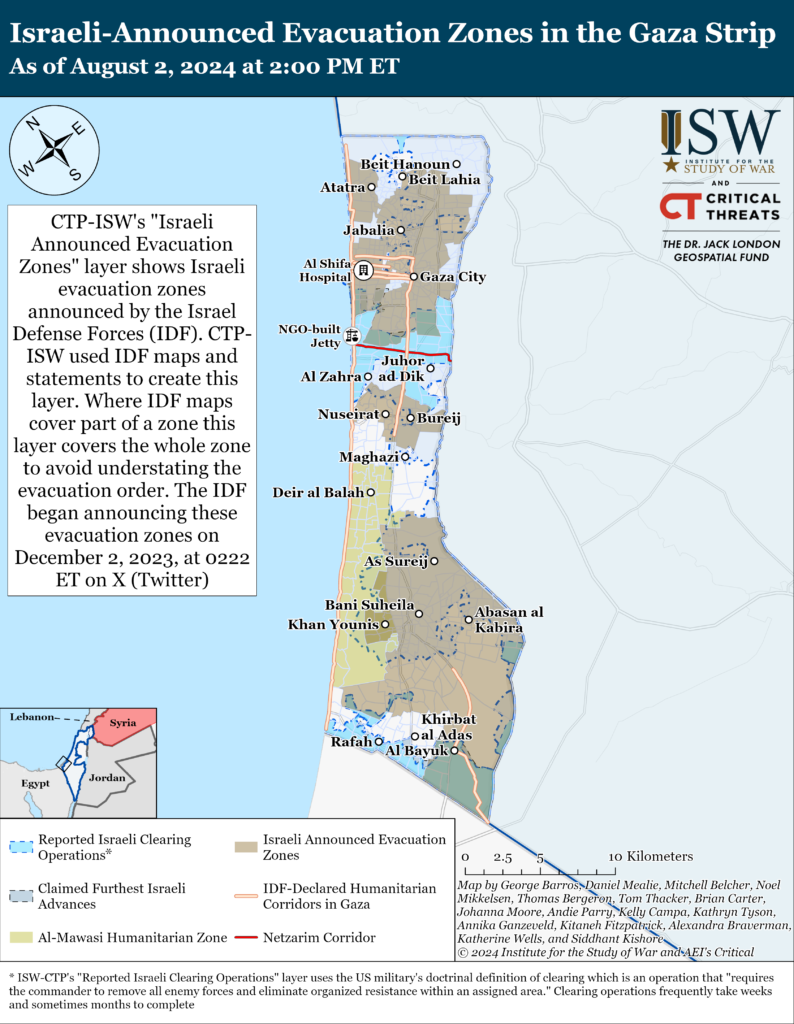
Palestinian fighters launched at least 20 rockets into southern Israel from the Gaza Strip on August 2.[36] The IDF detected a rocket that fell in an open area in Kiryat Malachi near Ashdod.[37] An Israeli military correspondent reported that most of the rockets, including the rocket that targeted Kiryat Malachi, were launched from an area between Khan Younis and Rafah, where the IDF is currently operating.[38] The correspondent reported that Hamas may be “emptying inventories” ahead of Israeli raids.[39] The IDF has not commented on its presence between Khan Younis and Rafah, but there is significant territory between Khan Younis and Rafah that the IDF has not yet cleared since the beginning of the war and several bulldozed roads that would provide them access to the area. The correspondent reported that the IDF has defined the South Khan Younis Battalion as not yet degraded and possessing “medium capabilities.”[40]
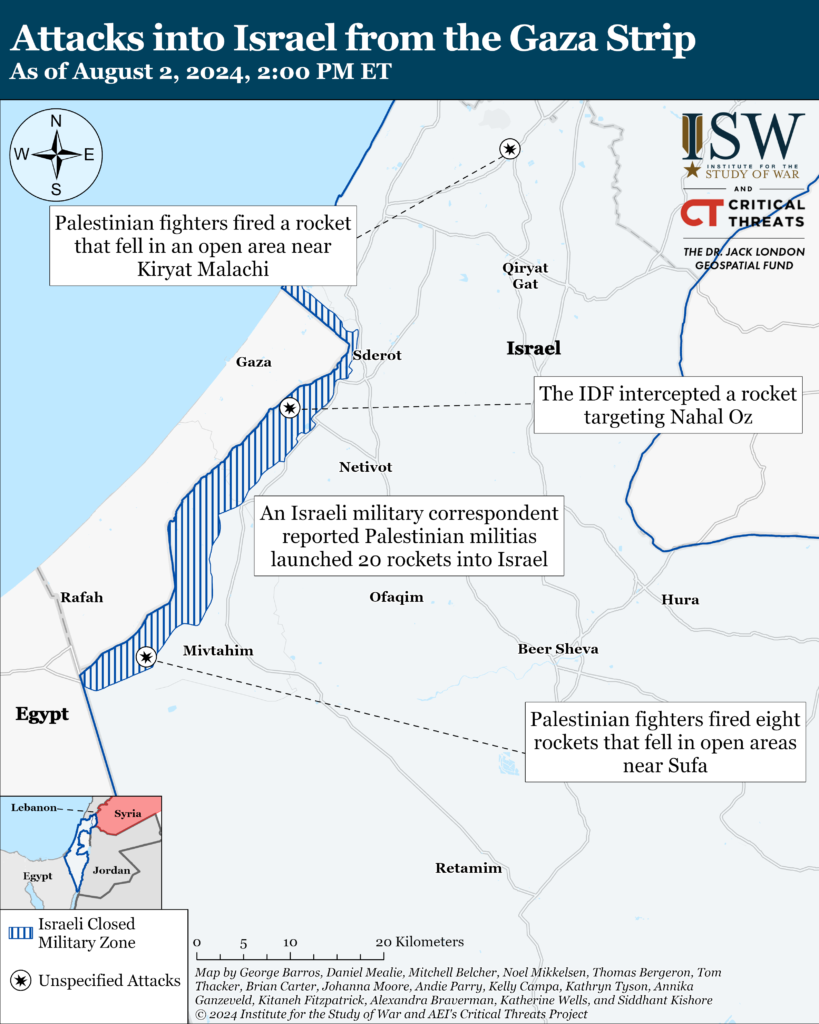
Recorded reports of attacks; CTP-ISW cannot independently verify impact.
West Bank
Axis of Resistance objectives:
Establish the West Bank as a viable front against Israel
Israeli forces have engaged Palestinian fighters in at least four locations in the West Bank since CTP-ISW’s last data cutoff on August 1.[41] The al Asqa Martyrs’ Brigades fired small arms targeting the Israeli town of Bat Hefer and the Shuweika border wall, north of Tulkarm.[42] Bat Hefer has been a particularly frequent target of Palestinian militia attacks in recent months.[43] Palestinian media reported that the IDF separately located a planted IED near the Einab checkpoint in Tulkarm.[44]
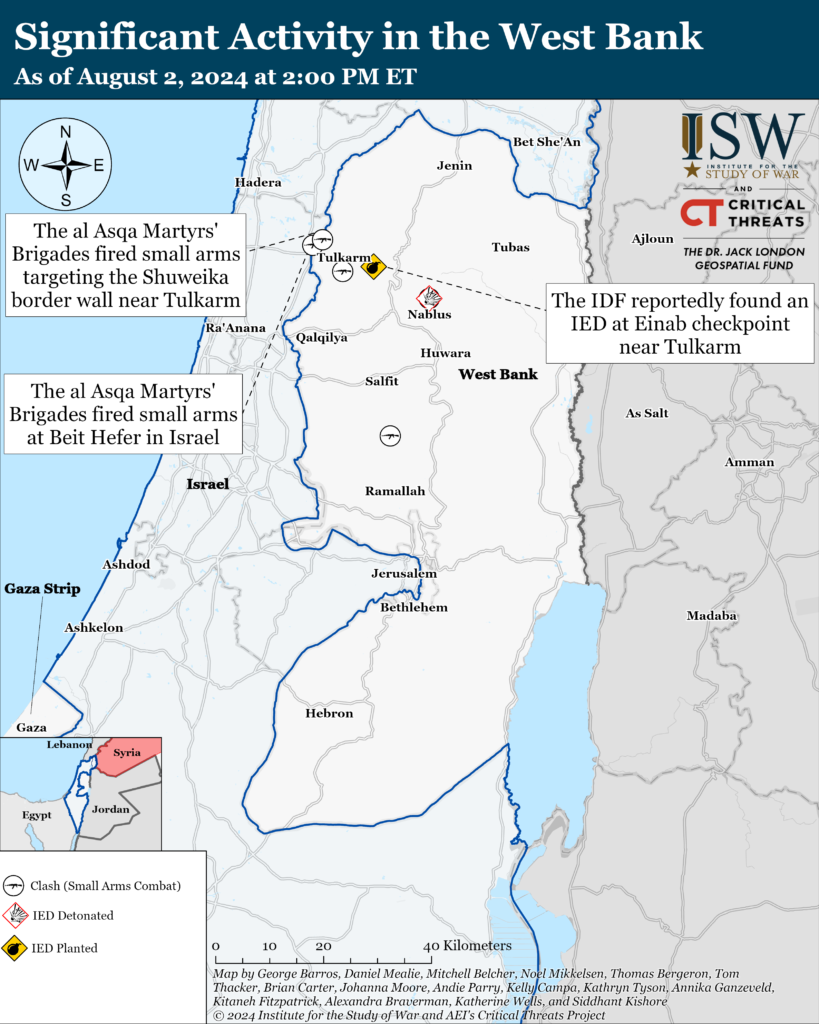
This map is not an exhaustive depiction of clashes and demonstrations in the West Bank.
Southern Lebanon and Golan Heights
Axis of Resistance objectives:
Deter Israel from conducting a ground operation into Lebanon
Prepare for an expanded and protracted conflict with Israel in the near term
Expel the United States from Syria
Lebanese Hezbollah renewed its cross-border attacks into northern Israel on the evening of August 1 and has conducted at least eight attacks since then.[45] Hezbollah Secretary General Hassan Nasrallah previously stated that Hezbollah attacks into northern Israel in support of the Gaza Strip would resume the morning of August 2.[46] Hezbollah later fired dozens of Katyusha rockets targeting Matzuva.[47] The IDF Air Force responded by conducting an airstrike targeting the rocket launch site in Yatar, southern Lebanon.[48] Hezbollah also fired an anti-tank guided missile targeting an IDF outpost on Ramim Ridge.[49] The IDF 91st Division identified two Hezbollah fighters in the area from which the rocket was launched and directed an airstrike against them in a Hezbollah building in Blida, southern Lebanon.[50] The IDF also said that Hezbollah attempted to launch rockets targeting Arab al Aramshe.[51] The rockets did not cross into Israel, however.[52] The IDF 9th Brigade identified and directed an airstrike targeting the Hezbollah fighters who had launched the rockets near Wadi Hamool, Lebanon.[53] The IDF also intercepted a drone over the Western Galilee.[54]
Saudi news media outlet Al Hadath reported on August 2 that Hezbollah evacuated its southern Beirut command centers and is transferring military equipment out of the area, citing unspecified sources.[55] Al Hadath reported that Hezbollah told tenants of buildings in which senior LH officials lived to evacuate.[56] CTP-ISW cannot verify Al Hadath’s reporting.
IDF Northern Command Commander Major Uri Gordin visited the Israel-Lebanon border on August 1 to observe drills and hold an operational assessment with forces training there.[57] Gordin expressed his confidence in the IDF’s ability and combat readiness against any threat from Hezbollah.[58]
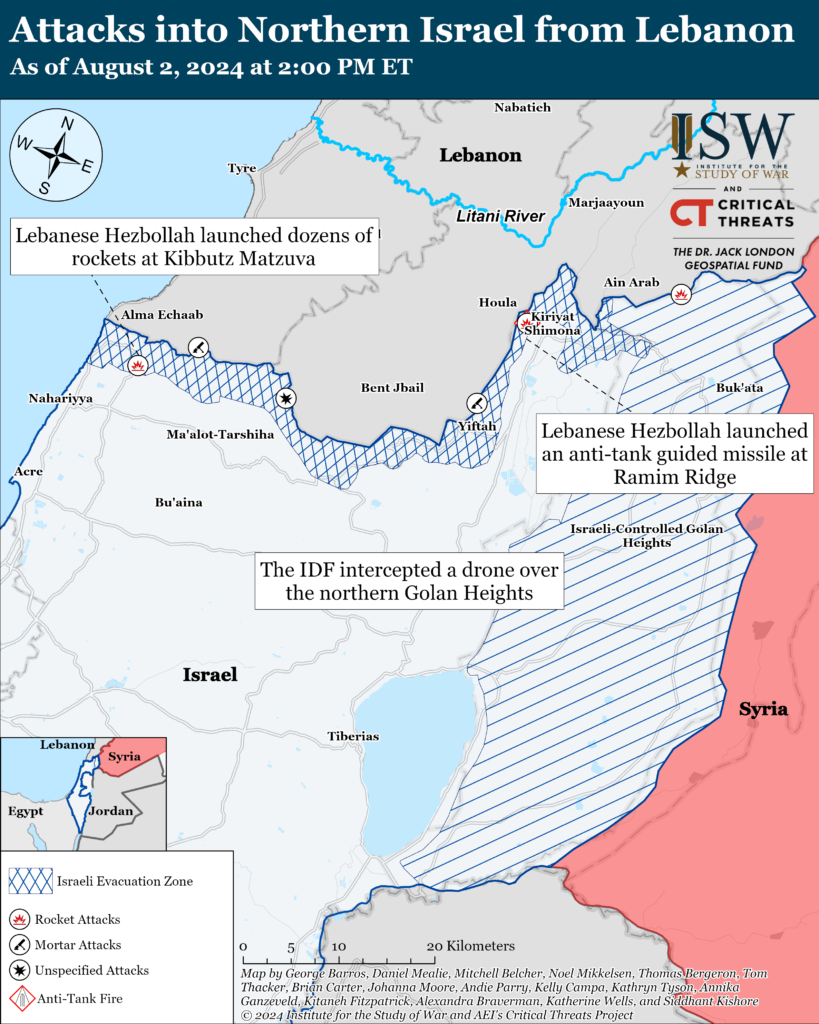
Iran and the Axis of Resistance
Iranian Interim Foreign Affairs Minister Ali Bagheri Kani held several phone calls with foreign officials to discuss regional tensions on August 1 and 2. Bagheri Kani emphasized that Israel had “crossed a red line” and violated Iran’s sovereignty in killing of Ismail Haniyeh in Tehran in multiple calls, including with Russian Foreign Affairs Minister Sergei Lavrov.[59] Bagheri Kani discussed Israel killing Haniyeh, Iran’s proposal for an Organization of Islamic Cooperation (OIC) foreign affairs ministers’ emergency meeting, and requested support for the meeting in a call with Jordanian Deputy Prime Minister and Foreign Affairs Minister Ayman Safadi.[60] Bagheri Kani may have during the call warned Jordan against supporting a US-Israeli effort to intercept the forthcoming Iranian attack on Israel.[61]
Israeli group “WeRedEvils” claimed responsibility for a cyberattack targeting Wi-Fi networks in Tehran and several other unspecified areas of Iran on August 2.[62] Iranian civilians reported that the attack did not affect fixed internet lines and that the extent of the attack is unknown. The group issued a message via Telegram saying “stop raising red flags, and start raising a white flag.”[63]
The Iranian Artesh Navy conducted a patrol with the Russian Navy in the northern and central Caspian Sea from July 30 to August 1.[64] The Iranian and Russian naval forces practiced combined offensive and defensive missions during the patrol. Iran conducted a similar naval exercise with Russia, Azerbaijan, Kazakhstan, and Turkmenistan in the Caspian Sea in July 2024.[65]
 Eurasia Press & News
Eurasia Press & News
